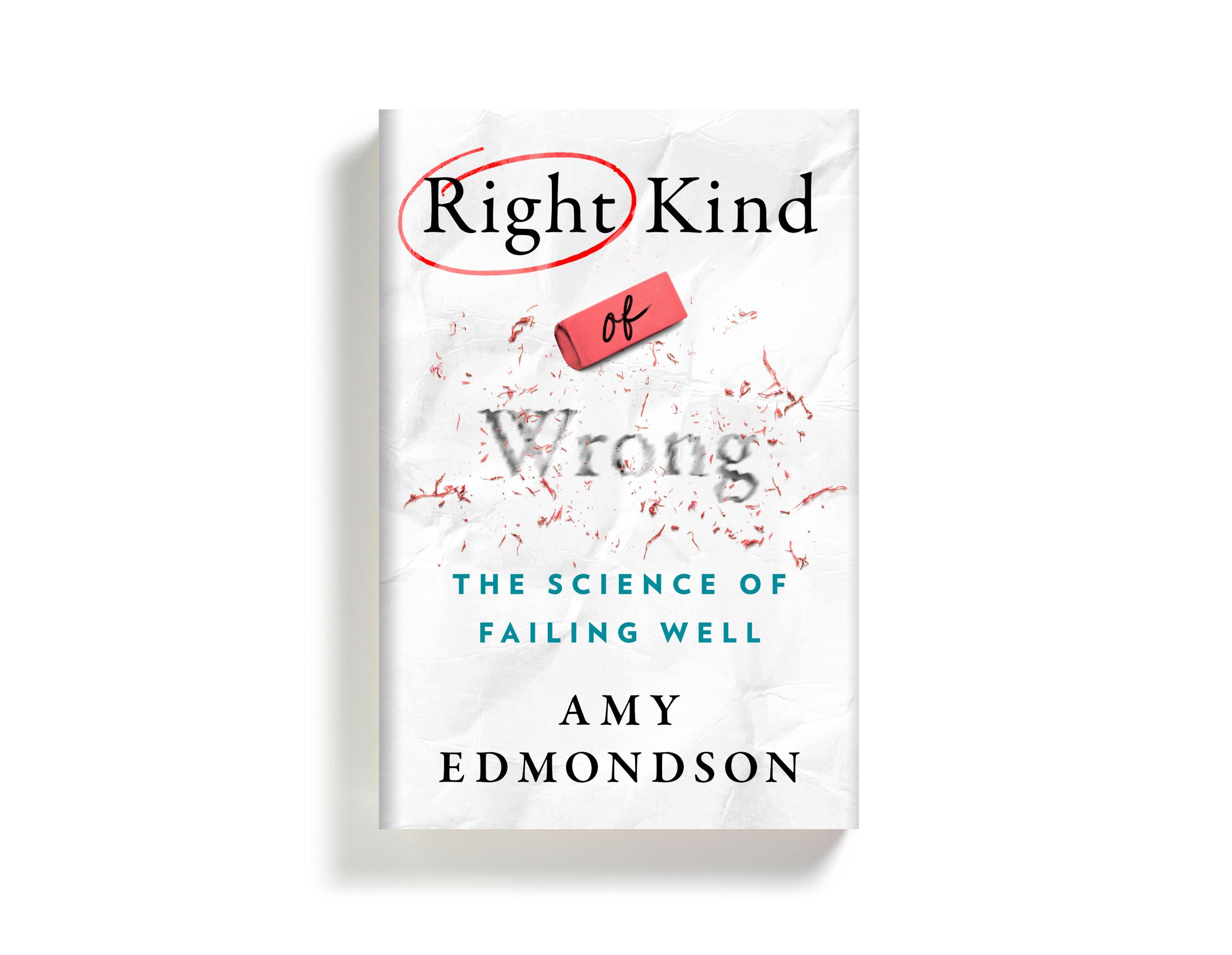Billie Jean King, winner of 39 Grand Slam Tennis titles, said, “Losing a tennis match isn’t failure, it’s research.” Thomas Edison said he hadn’t failed, but rather “found 10,000 ways that don’t work” in his quest to invent a working lightbulb. These game-changing pioneers can extol the benefits of failure all they want. But most of us find failure unpleasant. It helps, I believe, to realize that there is a “right kind of wrong”—a type of failure that brings valuable advances in science, as well as in everyday life. Called “intelligent failures,” these are the undesired results of thoughtful forays into new territory. Intelligent failures illuminate the pathway toward success.
Failure can also be a privilege. As journalist and University of Colorado professor Adam Bradley points out in a New York Times article, “One of the greatest underrecognized privileges of whiteness might be the license it gives some to fail without fear.” Bradley explains that being a member of a minority culture often means your failures, especially if they become public, are seen as representative of an entire group. Your individual failure reflects badly on everyone else like you. John Jennings, professor of media and culture studies at the University of California, Riverside, told Bradley, “I want to get to the point where Joe Schmo Black guy is just safe, can be ordinary—even mediocre.”
Stereotyping is a natural psychological process that causes people to generalize the actions of an individual to their group. This is especially true when a group is underrepresented in a given field or role. Thus, when a person of color fails in a consequential role, people tend to overgeneralize, seeing the failure as related to their race rather than to them as an individual. Intuitively aware of this, members of minority groups feel heightened pressure to succeed, so as to avoid triggering these biases—a pressure that ironically inhibits their ability to perform well.
In fact, that inventor and acoustician James West, whose intelligent failures resulted in more than 250 patents, including one for the electret microphone, was African American makes his success that much more noteworthy. He succeeded in his field despite the entrenched racism that had him being mistaken for a janitor while employed as a scientist at Bell Labs. Imagine the pressure he must have felt to avoid reducing the chances for others like him to follow in his footsteps at Bell Labs and other elite institutions.
Read More: How Bell Labs Invented the World We Live in Today
Women, especially women in academic science, also lack the luxury of failing unobtrusively. We are at risk of feeling pressure to succeed at all times lest we spoil other women’s opportunities. Scientist Jennifer Heemstra endorses “a culture in science and academia where people can be open about their failures without consequences.” A realist, she adds, “I’ll say that our responsibility to share our failures is proportional to the amount of power we have in the academic system.” As a tenured professor with her own lab at Emory University, Heemstra is now quite open about her failures. But she wasn’t always that way. Her most painful failure—not being voted for tenure the first time around (at a previous university)—turned out to be a gift. The failure was an interruption, forcing reflection.
“[Failing a tenure vote] was definitely the most painful failure of my life, as I felt like I had let down my family and my research group members—basically all of the people I care most about,” explained Heemstra to information-technology researcher Veronika Cheplygina, who also studies failure. “But it can also be a beautifully humbling experience as well. Seeing how all of those people stood by me in the midst of the struggle ended up seismically shifting my worldview and priorities. It gave me a new view of what academia could be and a fire to make that into a reality.”
Note that Heemstra didn’t try to slough off or ignore what she calls “a truly horrible feeling.” She acknowledged and named her feeling and let herself feel bad for a time. This is in line with findings from a 2017 study led by psychologist and researcher Noelle Nelson that focusing on your emotions, rather than thinking about the failure (which tends to generate self-justification), helps people learn and improve. Eventually, Heemstra developed a keen interest in failure that led to research into understanding how undergraduates experience failure in STEM courses and how this affects their decision to continue science careers. She and others have designed an undergraduate research curriculum to engage students in hands-on laboratory learning and give them experience with the right kind of wrong that is so central to discovery.

Similarly, embracing failure is a mainstay in queer (LGBTQIA+) theory and politics. In his seminal book The Queer Art of Failure, transgender media theorist Jack Halberstam argues that the measure and meaning of success is not defined by the individual but rather comes from communities, and that the norms of “success” lead toward a “mindless conformity.” In contrast, embracing failure allows a “free space of reinvention” from which to critique assumptions imposed by the world. Halberstam is part of a group of queer thinkers who see the experience of failure to meet society’s expectations as foundational to queer culture. Mainstays of what it means to live a “successful” life, such as biological prosperity, financial security, health, and longevity, had long been denied to queer people by discriminatory adoption laws, biases in hiring, acts of violence and prejudice, and even the HIV/AIDS epidemic. In failing to live up to heteronormative expectations, queer people must find their own ways to “succeed,” and a core and now celebrated part of this success is the recognition of having first failed.
For instance, drag performance, as an art form, celebrates the experience of queer people welcoming a lack of conformity to society’s expectations. Through its exaggerated contrast, the show makes society’s default expectations more visible. It makes us aware of heteronormative culture as a lens through which we view the world—nudging us out of our default sense, as naïve realists, that we objectively see reality. In the competition reality-television show RuPaul’s Drag Race, a group of mostly male-identified contestants adopt characters who are pastiches of femininity in hyperbolic performances of models and pageant contestants. The show celebrates liberation from expectations on a prime-time stage. And it’s wildly popular. The premiere of its 13th season on January 1, 2021, was, at the time, the show’s most watched episode, garnering 1.3 million viewers via simulcast, a number comparable to the 1.32 million viewers who tuned in to an average NBA game during the 2020–21 season.
Read More: You Just Don’t Silence a Drag Queen
Cultivating psychological safety is not the same thing as cultivating belonging, and many have conflated the two in recent years. Here’s how I see it: Psychological safety, which means believing it’s safe to speak up, is enormously important for feeling a sense of belonging. But belonging is more personal, while psychological safety is more collective (it is conceptualized in research studies as an emergent property of a group) and, I think, it is co-created by individuals and the groups to which they wish to belong. The more I study the research on the psychology, sociology, and economics of inequality, the more massive the undertaking of correcting these societal failures feels. At the very least, as a society, we should aspire to creating a world where everyone has an equal license to fail intelligently. That is not the case today. But I believe that we’re ever so slightly closer to that aspiration than we were even just a few years ago. Recognizing our heteronormative, white lens through which we view the world is an important first step.
Excerpted from RIGHT KIND OF WRONG published by Atria, a division of Simon & Schuster, Inc. Copyright © 2023 by Amy Edmonson.
More Must-Reads from TIME
- The New Face of Doctor Who
- Putin’s Enemies Are Struggling to Unite
- Women Say They Were Pressured Into Long-Term Birth Control
- Scientists Are Finding Out Just How Toxic Your Stuff Is
- Boredom Makes Us Human
- John Mulaney Has What Late Night Needs
- The 100 Most Influential People of 2024
- Want Weekly Recs on What to Watch, Read, and More? Sign Up for Worth Your Time
Contact us at letters@time.com
